- Home
- Deborah Harkness
Time's Convert Page 26
Time's Convert Read online
Page 26
“She’s my daughter. I love her,” Matthew replied, looking up at his son. “But I came close—so close—to lashing out. Like I did with Eleanor.”
And Eleanor had died. It had been a long time ago, in a different world and under very different circumstances, but Matthew had discovered in one horrible instant that loving someone was not always enough to protect them from harm.
“Like I did with Cecilia,” Matthew whispered, burying his head in his hands again.
Marcus wasn’t the only one in the house who was struggling with his memories.
“You aren’t the same man you were back then,” I said firmly.
“Yes, he is.” Marcus’s voice was rough.
“Marcus!” I was shocked. “How can you—”
“Because it’s the truth.”
“John Russell always said you were too sincere to be a de Clermont.” Matthew gave a humorless laugh. “He said I was mad to make you a vampire.”
“Why did you do it, then?” Marcus asked his father.
“You fascinated me,” Matthew replied. “I knew you had secrets, but you were honest and true in so many other ways. I couldn’t figure out how you managed it.”
“So it wasn’t my gift for healing,” Marcus said sardonically.
“That was part of it.” Matthew’s blood rage was being carried away on a tide of recollection. He settled more easily against the tree. “But the question really shouldn’t be why I changed you from a human to a vampire, but rather why you accepted my offer.”
Marcus took his time before he answered.
“Because I had nothing left to lose that mattered,” Marcus replied. “And I thought you might be the father that I had been searching for.”
Words of Two Syllables
THE NEW ENGLAND PRIMER, 1762
Absent
abhor
apron
author
Babel
became
beguile
boldly
Capon
cellar
constant
cupboard
Daily
depend
divers
duty
Eagle
eager
enclose
even
Father
famous
female
future
Gather
garden
glory
gravy
Heinous
hateful
humane
husband
Infant
indeed
incense
island
Jacob
jealous
justice
julep
Labour
laden
lady
lazy
Many
mary
motive
musick
21
Father
OCTOBER 1781
The hospital outside Yorktown echoed with the quiet sounds of death. Agitated limbs fought with worn sheets and blankets, making a soft rustle. And every few minutes, sighs floated through the air as the soldiers’ ghosts flew free.
Marcus lay on the cot in the corner, his eyes locked shut against the ghosts, unable to respond to calls for help that once would have had him rising to tend and comfort the sick. Tonight, he was just another soldier far from home, dying among his brothers-in-arms.
Marcus swallowed against the dryness in his throat. It was parched and raw from fever, and it had been hours since someone came through with the bucket and dipper. So many men in Washington’s army were ill with camp fevers—too many to care for now that the war was nearly over and the able-bodied were on their way home to their former lives.
He heard low voices at the entrance to the ward. Marcus clawed weakly at the sheets, hoping to get the orderly’s attention.
“What does this French soldier look like, Matthew?”
Lantern light flickered against Marcus’s closed eyelids.
“Dieu, John. How do I know?” The voice was familiar, tugging on Marcus’s memory. “I barely knew him. It’s Gil who wants him found.”
Marcus’s sticky eyes cracked open. His throat worked to make a sound, but nothing came out but a whisper that was far too low for anyone to hear.
“Chevalier de Clermont.”
Booted heels stopped on the dirt floor.
“Someone called my name,” the chevalier de Clermont said. “Speak up, Le Brun. We’ve come to take you from here.”
The lantern swung closer, closer. Its brightness pierced the thin skin of Marcus’s eyelids, sending rivers of pain through his fevered body. Marcus moaned.
“Doc?” Cool hands touched his forehead, his neck, pulled the sheets from his clawed hands. “Christ alive, he’s on fire.”
“I can smell death on the fellow’s breath,” the other man said. His voice was familiar, too.
There was a jostle of water against wood. De Clermont pressed the chipped edge of a dipper, slick from men’s spittle, against his lips. Marcus was too weak to swallow, and most of the water ran from the corners of his mouth.
“Take his head—gently, Russell—and hold him, just so, there.”
Marcus felt himself raised up. Liquid tipped into his mouth, cool and sweet.
“Tilt his head back. Just slightly,” de Clermont instructed. “Come, Doc. Swallow.”
But the water dribbled out again. Marcus coughed, racking his body and wasting more of his pitiful strength.
“Why won’t he drink?” the other man asked.
“His body is shutting down,” de Clermont said. “It’s refusing its own salvation.”
“Don’t be so bloody Catholic, Matthew. Not here, surrounded by all these proper Puritans.” Whoever was speaking—when had Marcus heard that voice before?—was trying to lighten the atmosphere with soldiers’ humor.
Marcus opened his eyes and saw the dead rifleman from Bunker Hill named Cole—the same man he’d seen at the hospital in Trenton wearing the clothing of a Virginian.
“You’re not Russell.” Against all odds, Marcus’s throat moved to swallow, and a drop of moisture slid down the parched tissues. “You’re Cole. And you’re dead.”
“So, sir, are you—or near enough, by the smell of you,” he replied.
“You know Doc?” De Clermont’s voice registered his surprise.
“Doc? No. I knew a boy named Marcus MacNeil once, a brave lad from the frontier with a marksman’s eye and a reckless disregard for orders,” the man from Bunker Hill replied.
“Name’s Galen,” Marcus croaked. “Galen Chauncey.”
The chevalier de Clermont tipped water into his mouth again. This time, a few spoonfuls made their way down Marcus’s raw gullet and into his stomach. The effort left him gasping. As quickly as it had gone down, however, the water came back up. His body wanted no part of it.
A cool, damp cloth wiped the crust from his eyes and traveled down to remove the residue of bile and water from his mouth and chin. Someone rinsed the cloth with fresh water before it mopped at his cheeks and stroked softly across his brows.
“Ma?” No one else had ever touched him with such tenderness.
“No. It’s Matthew.” His voice, too, was tender. Surely this wasn’t the same chevalier de Clermont who had cowed Dr. Shippen and silenced John Adams?
“Am I dead?” Marcus wondered aloud. If they were all gone to hell, then tonight would make better sense. Marcus didn’t remember that any of the vivid descriptions of the netherworld Reverend Hopkins had shared from the Hadley pulpit on Sundays had included an army hospital, but the devil was nothing if not creative.
“No, Doc. You’re not dead.” De Clermont pressed the dipper to Marcus’s mouth. This time, Marcus sipped and swallowed—and the water stayed put.
“Are you the devil?” Marcus asked de Clermont.
“No, but they’re on very close terms,” Russell replied.
Marcus saw that de Clermont’s companion was no longer wearing a hunting shirt or buckskins. Now the man was dressed in the smart red uniform of a British regimental.
“You’re a spy.” Marcus pointed a trembling finger.
“Wrong man, I’m afraid. It’s Matthew who gathers the intelligence. I’m just a soldier. The name is John Russell, Seventeenth Regiment of Light Dragoons. Death and glory boys. Formerly John Cole, First New Hampshire Regiment.” Russell patted the breast of his coat, which gave off a strange crinkling sound like it was full of paper. “Come, Matthew. There’s a war to finish.”
“Go. You’ve got the terms of surrender,” de Clermont said. “I’ll sit with Doc.”
“Why did the brotherhood wait so damn long to do something? We might have been spared this whole summer of campaigning—not to mention saved this boy’s life.”
“Ask my father.” De Clermont sounded as weary as Marcus felt. “Or Baldwin, if you can find him among the jaegers.”
“Oh, well. It’s no matter. If not for war, what would creatures like us do each spring?” Russell asked with a snort.
“I don’t know, John. Plant gardens? Fall in love? Make things?” De Clermont sounded wistful.
“You’re a sentimental old fool, Matthew.” Russell extended his right arm. De Clermont took it, clasping it at the elbow. It was an oddly old-fashioned farewell, one that seemed more appropriate to armored knights and Agincourt than to Yorktown’s battlefield. “Until next time.”
With that, Russell vanished.
* * *
—
MARCUS’S GRASP OF TIME and place loosened further after Russell’s departure. His fevered dreams were filled with odd, sharp fragments of his past, and he found it increasingly difficult to answer the chevalier de Clermont’s questions.
“Is there someone I should write to?” de Clermont asked. “Family? A sweetheart you left back home?”
Marcus shuffled through the ghosts of Hadley who haunted his waking hours: kindly Tom Buckland and his caring wife; Anna Porter, probably married by now; old Ellie Pruitt, probably dead; Joshua Boston, who had enough worldly cares without Marcus adding to them; Zeb Pruitt, his hero, who could barely read. His friends in the Philadelphia Associators had moved on with their own lives. For a moment, Marcus considered writing to Dr. Otto, who had given him a chance at a better life.
“No family,” Marcus said. “No home.”
“Everyone has a family.” De Clermont’s expression was thoughtful. “You are a curious man, Marcus MacNeil. What made you give up your name? When I met you at Brandywine, you were already Doc. And Galen Chauncey is an assumed name if ever I heard one.”
“Am a Chauncey.” Marcus found talking exhausting but would force himself to do so on this important point. “Like my mother.”
“Your mother. I see.” De Clermont sounded as though he understood.
“Tired.” Marcus turned his aching head away.
But the chevalier kept asking him questions. Whenever Marcus’s delirium abated, he answered them.
“What made you become a surgeon?” de Clermont asked him.
“Tom. He fixed me up. Taught me things.” Marcus remembered the lessons in anatomy and doctoring he’d learned in Buckland’s Northampton surgery.
“You should have gone to university, studied medicine properly,” de Clermont said. “You are already a fine physician. I suspect you might have been a great one, given an opportunity.”
“Harvard,” Marcus whispered. “Ma says Chaunceys go to Harvard.”
“Far be it from me to contradict your mother, but these days the best surgeons go to Edinburgh,” de Clermont replied with a smile. “Before they went to Montpellier or Bologna. Before that, it was Salamanca, Alexandria, or Pergamum.”
Marcus sighed, wistful at the prospect of so much knowledge, forever out of reach. “I wish.”
“And if someone could grant you that wish—could give you a second chance at life—would you take him up on the offer?” De Clermont’s face bore a strange, avid expression.
Marcus nodded. His mother would be so pleased if he went to college, even if he didn’t attend Harvard.
“And what if you had to wait a time before you could begin your studies—establish a new name, learn a new language, polish your Latin?” de Clermont asked.
Marcus shrugged. He was dying. Polishing his Latin seemed easy in comparison.
“I see.” De Clermont’s shrewd eyes darkened. “And what if you had to hunt, every day of your life, just to survive?”
“Good hunter,” Marcus replied, proudly thinking of the squirrels, fish, turkeys, and deer he’d shot to keep his family alive. Hell, he’d even gotten a shot off on a wolf once, though they were supposed to be gone and Noah Cook said it was just a mangy old dog.
“Marcus? Did you hear me?” De Clermont’s face was very close, and his eyes reminded Marcus of that gray and grizzled animal who yelped and ran away, never to be seen again. “You don’t have much time to decide.”
In his bones, Marcus felt he had all the time in the world.
“Pay attention, Marcus. I asked if you would be willing to kill someone for this chance to live a doctor’s life. Not an animal—a man.” De Clermont’s voice held a note of urgency that cut through Marcus’s fever and the fog of disorientation and pain that accompanied it.
“Yes—if he deserved it,” Marcus said.
* * *
—
MARCUS SLEPT FOR A WHILE after that. When he woke, the chevalier de Clermont was in the midst of a story that was more fantastic than Marcus’s own dreams. He said he had lived for more than a thousand years. That he had been a carpenter and a mason, a soldier and a spy, a poet, a doctor, a lawyer.
De Clermont spoke of some of the men he had killed. Someone in Jerusalem, and others in France and Germany and Italy. And he mentioned a woman, too, someone named Eleanor.
There were frightening parts to the story, elements that made Marcus think he was indeed in hell. The chevalier talked about his taste for blood, and how he drank from living creatures and tried not to kill them. Surely such a thing was impossible.
“Would you drink from a man’s veins to survive?” Even in the midst of his story, the chevalier de Clermont kept asking questions.
Marcus was burning up with fever, his mind addled with the heat and the pressure in his veins.
“If I did, would the pain stop?” Marcus asked.
“Yes,” de Clermont replied.
“Then I would,” Marcus confessed.
* * *
—
MARCUS DREAMED HE WAS FLYING, high and fast above the hospital. The floor below was stained with vomit and worse, and mice foraged for scraps to eat.
Then everything turned green as the hospital tent vanished and the filthy
floor became grass, and the grass turned to forest. The forest grew deeper, greener. Marcus moved faster and faster. He never climbed higher, but his rapid progress turned the whole world to a blur of green and brown and black. Marcus felt the air, cold against his fevered body. His teeth chattered like the skeleton in Gerty’s front room in Philadelphia.
Day became night, and he was flying on a horse. Someone slapped him. Hard.
“Don’t die.” A man with dark eyes and pale skin stared down at him. “Not yet. You have to be alive when I do this.”
The chevalier de Clermont was in his dream now, and so was Russell. They were in a sheltered glade, surrounded by trees. With them was a band of Indian warriors who obeyed de Clermont’s orders.
“What are you doing?” Russell asked de Clermont.
“Giving this boy a second chance,” answered de Clermont.
“You have a war to finish!” Russell said.
“Cornwallis won’t be in any rush to agree to the terms of surrender. Besides, I have to collect the mail,” de Clermont said.
Marcus finally understood why the colonial mail service was so expensive and unreliable: It was run by devils and dead men. He laughed at the image of Beelzebub, mounted on a black horse, carrying a sack of post. But the mirth split his head in two like a rotten apple, and his mouth filled with the bitter tang of blood.
Something had hemorrhaged.
“No more.” For Marcus, those three words encapsulated a lifetime of disappointment and broken promises.
“War is a hellishly difficult time to become a wearh, Matthew,” Russell said, worried. “Are you sure?”
Now Russell was asking questions, too.
“Yes,” Marcus and de Clermont said at the same time.
A sudden, searing pain at his neck told Marcus that his carotid artery had ruptured. It was too late. He would surely die now, and there was nothing that anyone could do for him.
With a deep, rattling breath, Marcus gave up the ghost trapped in his body.

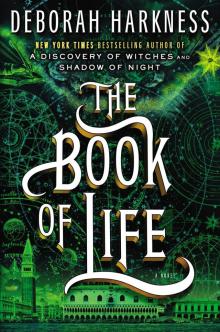 The Book of Life
The Book of Life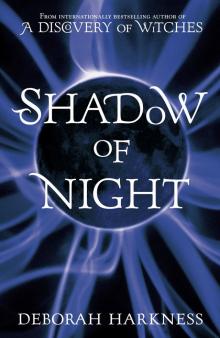 Shadow of Night
Shadow of Night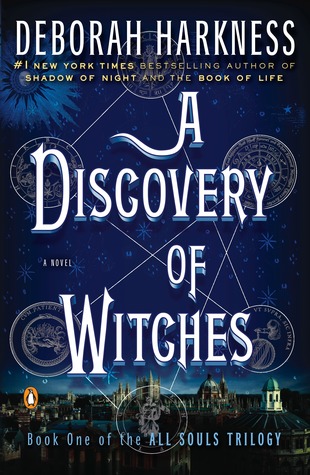 A Discovery of Witches
A Discovery of Witches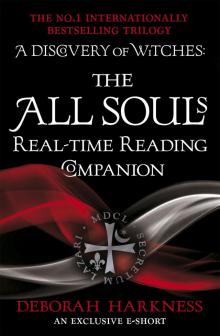 The All Souls Real-Time Reading Companion
The All Souls Real-Time Reading Companion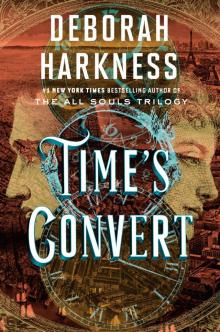 Time's Convert
Time's Convert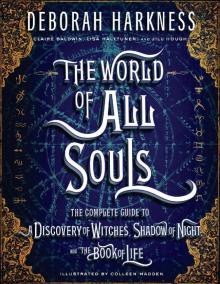 The World of All Souls
The World of All Souls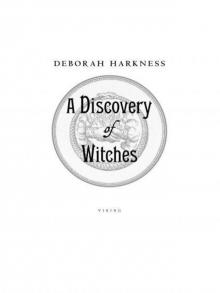 A Discovery of Witches: A Novel (All Souls Trilogy)
A Discovery of Witches: A Novel (All Souls Trilogy)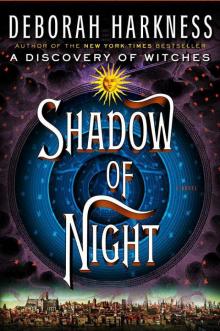 Shadow of Night: A Novel
Shadow of Night: A Novel